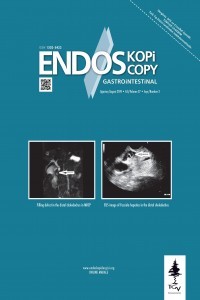Gastrointestinal sistem lezyonlarının değerlendirilmesinde gastroenterolog ve patolog uyumluluğu ne orandadır?
Giriş ve Amaç:Çalışmadaki amacımız gastrointestinal sistem lezyonlarının gastroenterolog ve patologlar arasındaki tanısal uyumluluk oranını değerlendirmektir. Gereç ve Yöntem:Merkezimizde 2010-2012 Nisan tarihleri arasında üst ve alt gastrointestinal sistem endoskopisi yapılan ve biyopsi alınan 231 hasta çalışmaya dahil edilmiştir. Çalışma mukozal irregülarite, ülserovejetan kitle, ülser ve polip olmak üzere 4 endoskopik lezyon ve polip, ülser, gastrit ve adenokarsinom olmak üzere 4 histopatolojik tanı üzerine kurulmuştur. Bulgular:Tüm hastaların 199'una (%86.1) gastrik ve duodenal, 32'sine (%13.9) ise kolonik ve rektal biyopsi yapılmıştı. Hastaların yaş ortalaması 63.5 yıl olup, lezyonların mikroskopik boyut ortalaması 12 mm idi. Hastaların 54'ü (%23.4) histopatolojik olarak malignite tanısına sahip olup bunların %59.4'ü alt, %17.7 si üst gastrointestinal sisteme aitti. Sonuç: Çalışmada merkezimizdeki patolog ve endoskopistler arasındaki tanısal uyumun düşük olduğu saptandı. Uyumsuzluğun muhtemel nedenleri endoskopist deneyimi ve kullanılan endoskopik aletler olarak yorumlandı
Anahtar Kelimeler:
Gastrointestinal lezyon, endoskopi, histoloj
What is the consistency between the diagnoses of endoscopists and pathologists concerning malignant lesions of the gastrointestinal tract?
Background and Aims:To examine the association between endoscopic and histological diagnoses concerning malignancies of the gastrointestinal tract. Material and Methods:Two hundred thirthy one patients who underwent upper or lower gastrointestinal system endoscopy and had endoscopic biopsy were recruited retrospectively from the files of our center between the years of 2010 and 2012. The study was based on four types of endoscopic lesions including: mucosal irregularity, ulcerovegetating mass, ulcer and polyp, and four histopathologic diagnoses including polyps, ulcer, gastritis and adenocarcinoma. Results:In all, 199 of 213 (86.1%) patients had gastric and duodenal biopsies and the remaining 32 (13.9%) had colonic and rectal biopsies. The mean age of the patients was 63.5 years and the mean microscopic size of the lesions was 12 mm. Fifty four (23.4%) patients had histopathologic diagnosis of malignancy. Of all the lower gastrointestinal system biopsies, 59.4% were diagnosed as malignant whereas the rate was only 17.7% for upper gastrointestinal system biopsies. Conclusions:The rate of compatibility for diagnosing the malignant lesions of the gastrointestinal system between gastroenterologists and pathologists is low and the probable reasons for this discrepancy may be attributed to the experience of the endoscopist and the endoscopy tool used
Keywords:
Gastrointestinal lesion, endoscopy, histopathology,
___
- Escourrou J, Salcedo J, Buscail L. Upper gastrointestinal endoscopy. In: Classen M, Tytgat GNJ, Lightdale CJ, eds. Gastroenterological endosco- py. New York: Thieme, 2002;113-24.
- Bird RP. Role of aberrant crypt foci in understanding the pathogenesis of colon cancer. Cancer Lett 1995;29:55-71.
- Al Hamdani A, Fayadh HM, Abdul Majeed BA. Helicobacter pylori gas- tritis: correlation between endoscopic and histological findings. IJGE 2001;1:43-8.
- Kasap E, Güngör G, Aygör E, et al. What is the consistency between the diagnoses of endoscopists and pathologists concerning gastroduodenal mucosa? Endoscopy 2012;20:13-6.
- Jonsson KA, Gotthard R, Bodemar G, Brodin U. The clinical relevance of endoscopic and histologic inflammation of a gastroduodenal mucosa in dyspepsia of unknown origin. Scand J Gastroenterol 1989;24:385-95.
- Myren J, Serck-Hanssen A. The gastroscopic diagnosis of gastritis, with particular reference to mucosal reddening and mucus covering. Scand J Gastroenterol 1974;9:457-62.
- ISSN: 1302-5422
- Başlangıç: 2010
- Yayıncı: Türk Gastroenteroloji Vakfı
